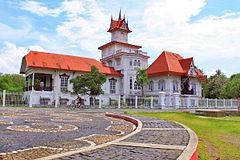Independence Day (Philippines)
| Independence Day Araw ng Kalayaan |
|
|---|---|

Aguinaldo Shrine where Emilio Aguinaldo declared the country's independence from Spain
|
|
| Official name | Araw ng Kasarinlan |
| Also called | Araw ng Kalayaan Twelfth of June |
| Observed by | Philippines |
| Type | National |
| Significance | Declaring Philippine independence from Spain |
| Date | June 12 |
| Next time | 12 June 2017 |
| Frequency | annual |
| Related to | Republic Day |
Independence Day (Filipino: Araw ng Kasarinlan; also known as Araw ng Kalayaan, (or "Day of Freedom") is an annual national holiday in the Philippines observed on June 12, commemorating the Philippine Declaration of Independence from Spain on June 12, 1898. Since 1962, it has been the country's National Day.
The day of celebration of independence varied throughout the nation's history. The earliest recorded was on April 12, 1895, when Andres Bonifacio, along with Emilio Jacinto, Restituto Javier, Guillermo Masangkay, Aurelio Tolentino, Faustino Manalak, Pedro Zabala and few other katipuneros went to Pamitinan Cave in Montalban, Rizal to initiate new members of the Katipunan. Bonifacio wrote Viva la independencia Filipina! or Long Live Philippine independence on walls of the cave to express the goal of their secret society. Bonifacio also led the Cry of Pugad Lawin, which signals the beginning of Philippine Revolution. Members of the Katipunan, led by Andres Bonifacio, tore their community tax certificates (cedulas personales) in protest of Spanish conquest.
In 1896 the Philippine Revolution began and in December 1897 the Pact of Biak-na-Bato, an agreement between the Spanish colonial government and the revolutionaries, established a truce. Under its terms, Emilio Aguinaldo and other revolutionary leaders went into exile in Hong Kong.
...
Wikipedia
